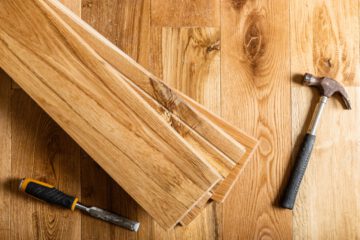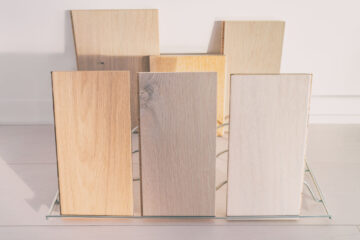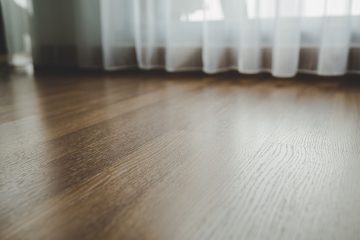The glue down method of laying hardwood floors is one of the original methods of installing hardwood flooring. If you want to learn the basics of how to install hardwood flooring using the glue down method, you’ve come to the right place. Among do-it-yourself hardwood floors, those done with the glue down method can be the most stable and enduring. When you are installing hardwood flooring Dallas using the glue down method, you can rest assured that you are using a technique that has been time-tested.
Tools Needed When Installing Hardwood Flooring
Square Notched Trowel – This trowel should have one-quarter-inch sides for the application of the glue.
Broom and Dust Pan – You’ll want to constantly be cleaning up any sawdust that could get stuck under your floor panels or get stuck in your connecting joints. The last thing you need is a lumpy hardwood floor when you’re done installing hardwood flooring.
Carpenter’s Crayon – This is what you use to mark where you’ll make your cuts on your panels. You’ll also use this to mark up the surface where you’ll be laying your panels. You’ll want to keep this handy at all times because it is particularly important with the glue down method that everything is done very precisely.
Circular Saw – You’ll use your circular saw to cut up panels as necessary. Additionally, you’ll use your circular saw to score your substrate sheets every eight inches. This is important for the prevention of curling panels.
Glue – Many hardwood panel kits come with their own glue. If you need to buy glue for your hardwood panels, I highly recommend Bostik’s Best Adhesive.
Lace Nails – You’ll use these nails when connecting the panels to walls and wall strips.
Plywood Substrate Sheets – These are placed on top of the concrete and go underneath your hardwood floor.
Soft Cloths – You’ll need these to clean up excess glue throughout the process of installing hardwood flooring. If the glue is allowed to set, it’ll take extra measures to remove it. In some cases, it requires special chemicals and glue to remove glue once it has been set. You’ll also need your soft clothes to clean up after you’ve installed your hardwood floors.
Rubber Gloves – It’s much better to glue the fingers of your gloves together than your own fingers together! Besides, many people don’t like having dried glue on their hands for weeks after they finish installing hardwood flooring.

Final Preparation for Installing Hardwood Flooring
When using the glue down method for installing hardwood flooring, it is absolutely essential that the surface where you will be placing your flooring panels is properly prepared. You’ll be attaching your flooring panels to this surface, so the floor must be smooth, dry, and as clean as possible to give your hardwood floor a solid support base. Be particularly careful to clean up anything that looks like it may be grease or oil, as your glue may not properly bond. It’s also very important that your subfloor be completely level and flat. If you notice any unevenness, get some patching cement from the hardware store to even the sub floor.
You also need to choose between one of the two methods of laying hardwood panels down with the glue down method. Your choices for installing hardwood flooring are the Walk On method or the Wet Lay method.
If you choose the Wet Lay method for installing hardwood flooring, you’ll be putting glue across the substrate followed by placing the hardwood panel on top of the glue. After the glue starts to become tacky, you proceed to the next panel. However, sometimes it is recommended for first-time installers using the glue down method to place the next panels before the glue becomes tacky so that you can adjust your panels a few minutes later if they are not lined up properly.
The Walk On method of installing hardwood flooring requires precise panel laying. This process of installing hardwood flooring waits until the glue is very tacky and then lays the panel in the glue. This keeps you from getting glue smudges all over your panels as you go. Experienced hardwood installers typically use the Walk On method because of the better-finished results it can provide. Since you are reading instructions about how to install hardwood floors, we’ll assume you’re using the Wet Lay method.
Instructions for Installing Hardwood Flooring
- Place your substrate sheets, stretched across the foundation. Make sure that the surface is level, clean, and free of debris.
- Get your glue warm. It should be slightly above room temperature or it will be very difficult to work with. If it’s below room temperature, you’ll find it impossible to work with your glue.
- Use your square notched trowel to put glue in the starting corner of the room. Put enough to securely fasten the board, but ration your glue so that it’ll be able to complete the entire hardwood flooring process. If you had any doubt about whether you have enough glue, it would have been a good idea to buy more before you started gluing. You’ll typically find that it takes an extra day to do the flooring when you run out of glue before you’ve finished.
- Try to place your first wood panel straight down on the glue, secured into the corner. Since you are working with wet glue, place the panel as best you can at first so that you’ll not be smearing the glue around as you adjust the panel’s placement. If you had used the Walk On method, you wouldn’t be able to move the panel at all only a few seconds after placement.
- You can continue on as in the above steps with adding more panels until you reach the last panel, which shouldn’t completely fit. Use your crayon to mark where to cut the board and your saw to make the cut.
- Get your first row wedged in really tight so that it will provide a solid basis for your entire floor.
- Before any of the glue dries, use a soft cloth to clean up any glue that may be sitting on the surface of your first row. The longer you wait to clean up the glue, the more difficult it will get to clean up the glue.
- Hopefully you didn’t mutilate the excess piece of the panel you cut off to end the first row. That’s going to be the panel you use to start the next row. This helps make sure your hardwood floor looks nice by having all of the panels offset.
- If you’re seeing any bubbles, hills, or slopes on the panels you’ve been laying, put a heavy, flat object on top of these sections to hold them down until the glue attaches them to the substrate.
- Clean up again. Get all of that sawdust and glue out of there. A soft cloth with mineral spirits on it can be used to get glue you’ve missed that may be hardening. Clean the mineral spirits off quickly to avoid having them damage the floor. You should have a nice, new hardwood floor.
Hindsight Tips for Installing Hardwood Flooring
- For best results, use plywood sheets to form your substrate.-The thicker your substrate sheets are, the easier it is to compensate for leveling differences at the surface. But you should still try to get the surface as level as possible before laying your substrate sheets.
- If you have enough flat, heavy objects, place them on each new panel as you place the panel on the floor to help it get the best possible attachment to the substrate. Don’t use anything that can damage the surface of your panels. If you have nothing else, you can always lay on the panels. Be careful not to get glue on top of them though.
Rest Assured That You Made a Good Choice Installing Hardwood Flooring
When you have your hardwood floor glued down, you are ready to experience a great sense of accomplishment. If you did a really good job of installing your hardwood flooring using the glue down method, you will not experience nearly as much creaky floor syndrome as you would with other methods of installation. And for your sake, I really hope you followed the instructions carefully and picking out high-quality flooring. This is because replacing a glued down hardwood floor is no task for amateurs. That is unless you’ve got destructive pleasure tendencies. You’ll need some serious sledgehammer, crowbar, and circular saw work if you ever want to replace that glued down hardwood floor.


